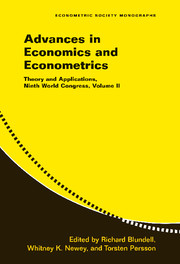Book contents
- Frontmatter
- Contents
- Contributors
- Introduction by the Editors
- Advances in Economics and Econometrics
- 1 Empirical Models of Auctions
- 2 Identification in Models of Oligopoly Entry
- 3 Empirical Models of Imperfect Competition: A Discussion
- 4 Recent Developments in the Economics of Price Discrimination
- 5 Bounded Rationality in Industrial Organization
- 6 Price Discrimination and Irrational Consumers: Discussion of Armstrong and Ellison
- 7 Behavioral Economics
- 8 Incentives and Self-Control
- 9 Discussion of “Behavioral Economics”
- 10 Dynamic Models for Policy Evaluation
- 11 Microeconometric Search-Matching Models and Matched Employer-Employee Data
- 12 Discussion of ‘Dynamic Models for Policy Evaluation’ and ‘Microeconometric Search-Matching Models and Matched Employer-Employee Data’
- 13 Field Experiments in Development Economics
- 14 Institutions and Development: A View from Below
- Index
- Titles in the series
1 - Empirical Models of Auctions
Published online by Cambridge University Press: 05 January 2013
- Frontmatter
- Contents
- Contributors
- Introduction by the Editors
- Advances in Economics and Econometrics
- 1 Empirical Models of Auctions
- 2 Identification in Models of Oligopoly Entry
- 3 Empirical Models of Imperfect Competition: A Discussion
- 4 Recent Developments in the Economics of Price Discrimination
- 5 Bounded Rationality in Industrial Organization
- 6 Price Discrimination and Irrational Consumers: Discussion of Armstrong and Ellison
- 7 Behavioral Economics
- 8 Incentives and Self-Control
- 9 Discussion of “Behavioral Economics”
- 10 Dynamic Models for Policy Evaluation
- 11 Microeconometric Search-Matching Models and Matched Employer-Employee Data
- 12 Discussion of ‘Dynamic Models for Policy Evaluation’ and ‘Microeconometric Search-Matching Models and Matched Employer-Employee Data’
- 13 Field Experiments in Development Economics
- 14 Institutions and Development: A View from Below
- Index
- Titles in the series
Summary
INTRODUCTION
Auctions have provided a fruitful area for combining economic theory with econometric analysis in order to understand behavior and inform policy. Early work by Hendricks and Porter (1988) and others made important contributions by testing the empirical implications of auction theory. This work provided convincing evidence of the empirical relevance of private information and confirmed the value of strategic models for understanding firm behavior. However, many important economic questions can be answered only with knowledge of the underlying primitive distributions governing bidder demand and information. Examples include the division of rents in auctions of public resources, whether reserve prices in government auctions are adequate, the effects of mergers on procurement costs, whether changes in auction rules would produce greater revenues, whether bundling of procurement contracts is efficient, the value of seller reputations, the effect of information acquisition costs on bidder participation and profits, whether bidders' private information introduces adverse selection, and whether firms act as if they are risk averse. Many of these questions have important implications well beyond the scope of auctions themselves.
Motivated by a desire to answer these questions, a more recent literature has developed that aims to estimate the primitives of auction models, exploiting restrictions from economic theory as part of the econometric model. Typically, such a “structural” approach incorporates two types of assumptions: (a) economic assumptions, such as behavioral assumptions (e.g. Bayesian Nash equilibrium) and economically motivated restrictions on preferences (e.g., risk neutrality), and (b) functional form assumptions, imposed either for convenience in estimation or because only a limited set of parameters can be identified.
- Type
- Chapter
- Information
- Advances in Economics and EconometricsTheory and Applications, Ninth World Congress, pp. 1 - 45Publisher: Cambridge University PressPrint publication year: 2006
- 8
- Cited by



